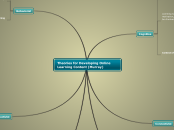jonka Alex Murray 10 vuotta sitten
366
Online Learning Theory
Theoretical Connections for Online Learning

jonka Alex Murray 10 vuotta sitten
366

Lisää tämän kaltaisia
Situation encountered during learning process
Self image of learner
Process in which learning occurs
Conditions of communication
Frame of reference for learning